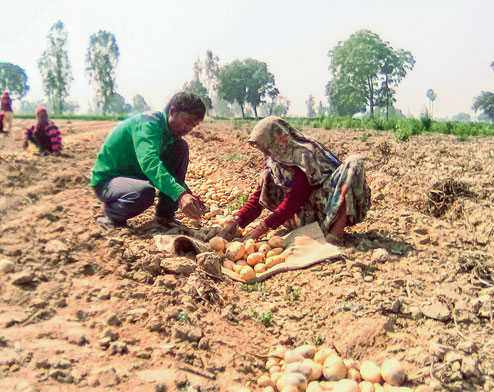
Farrukhabad, Feb. 17: Sushil Kumar Dikshit says the demonetisation has wounded potato farmers like him but he and his fellow Brahmins would still vote for the BJP on Sunday.
Yadav farmers see the November note recall as a "demon" but say they would have supported the Samajwadi Party even if the demonetisation never happened.
Across central Uttar Pradesh constituencies that vote in the third phase on February 19, people seem agreed that the "note bandi" has hurt livelihoods. But how it might affect the Assembly polls is harder to assess, with caste and community leanings appearing to trump economic logic for many.
Among the few dissenters is Mehboob Alam, a small-time building contractor from Kanpur district. He insists the note recall has changed the minds of many who would ordinarily have backed Prime Minister Narendra Modi.
"Had the note ban not happened, Modi would have formed the government in Uttar Pradesh. The demonetisation has upended his game," Alam, 52, said at Belaur market.
Dikshit said he had lost a couple of lakhs of rupees this season because the note recall had left people without cash, worsening the effects of a bumper crop.
"Last season, I sold a sack of potato (weighing 52-55kg) for Rs 600-700; this season the price fell to Rs 150-200. I couldn't recover my input cost," the resident of Salempur, a village of "Pandits" in Farrukhabad, said.
But he insisted that this would have no impact on votes. "This time, all the Brahmins will vote for the BJP," Dikshit said, drawing vigorous nods all around.
"We had voted for Mayawati in 2007 and for the Samajwadis in 2012. But not this time, after the way Akhilesh has neglected Brahmins."
Most upper caste voters said they would support the BJP, as did most non-Yadav backward caste farmers, while acknowledging the distress caused by the demonetisation.
"We have suffered; we couldn't recover even the labour cost. But the note bandi will prove good for the country and for everybody in future," claimed Sujit Kumar Katiyar, a potato farmer.
A rare exception was Anil Kumar Rajput, a landowning upper caste resident of Pasningpur village in Farrukhabad. His choice of Akhilesh, however, was driven more by the chief minister's performance than any anger at the demonetisation.
"Most members of our caste say they will vote for the BJP but I'll vote for Akhilesh. He has performed," Anil said.
Akhilesh is banking on voters like Anil with his poll slogan of " Kaam bolta hai (work talks)".
Most Rajputs and Thakurs, though, argued that while Akhilesh may be a good man, his party's district and block-level functionaries were knee deep in crime and corruption. The Rajputs and Brahmins see the BJP as their "natural party" that would serve their interests if it comes to power.
Reminded that the BJP under Modi was trying to transform itself into a party of the poor and backward castes, Dharmnath Dubey of Naglabag village was dismissive: "These things have to be done to win elections."
Farrukhabad, Kannauj, Mainpuri and Etawah are regarded as Samajwadi pocket boroughs but the Brahmins there are hopeful of "our party" coming to power after a long "exile". They are banking on the Muslim vote splitting between Mayawati and the Akhilesh-Rahul combine.
"In Farrukhabad, for instance, Mayawati has fielded a Muslim and the Samajwadis a Hindu. This should split Muslim votes. This is happening across the state," said Bhupendra Dwivedi in Farrukhabad town.
The BJP vote too risks a division in Farrukhabad, though. Manoj Agrawal, a trader whom the BJP had denied a ticket, is contesting as an Independent. Many in the BJP feel that faulty candidate selection might cost the party.










